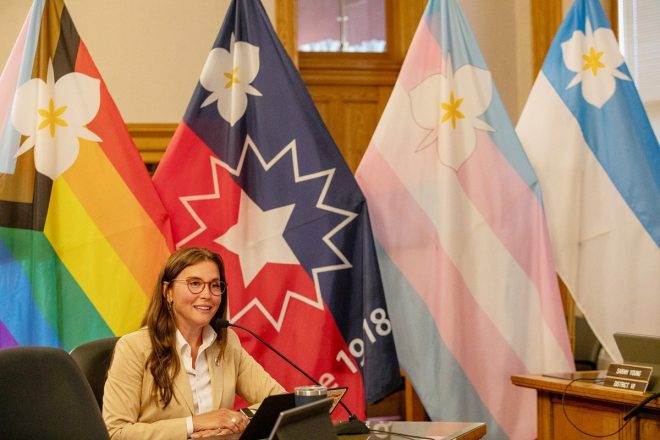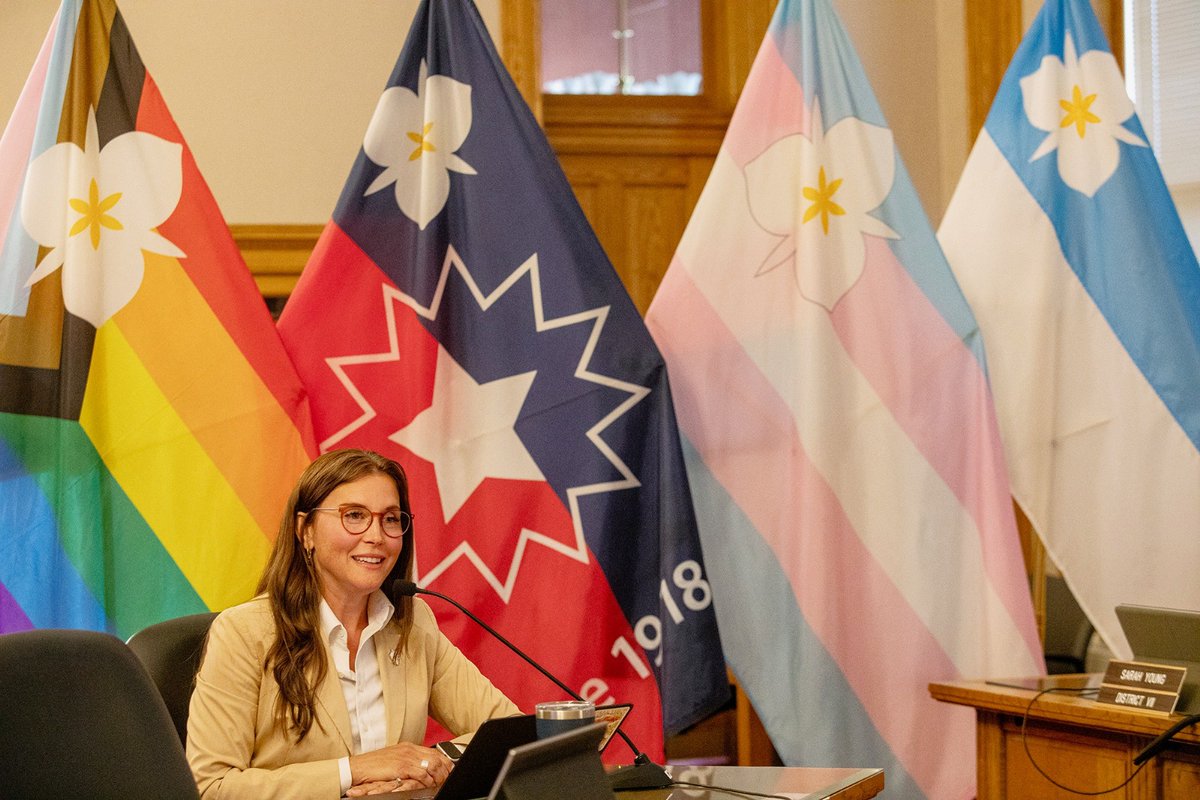
Salt Lake City Mayor Erin Mendenhall’s Bold Flag Proposal
In a recent move that has sparked both support and controversy, Salt Lake City Mayor Erin Mendenhall, a democrat, has proposed the adoption of three new flags as "official" city flags. This initiative is designed to navigate around Utah state laws that prohibit the display of political and non-official flags on government buildings. The flags in question include the Pride flag, the transgender flag, and another yet-to-be-disclosed design that is expected to resonate with the city’s diverse community and values.
Understanding the Proposal
Mayor Mendenhall’s proposal aims to reflect the inclusivity and progressive values of Salt Lake City. By designating these flags as official, the mayor seeks to promote a message of acceptance and support for the LGBTQ+ community. The Pride flag, symbolizing the celebration of LGBTQ+ identities, and the transgender flag, which represents transgender individuals and their rights, are particularly significant in a city that has been working towards greater inclusivity in recent years.
This proposal comes in the wake of a broader national conversation about representation and the importance of visibility for marginalized communities. By adopting these flags, Salt Lake City aims to stand as a beacon of hope and acceptance, encouraging other municipalities to follow suit.
Navigating State Law
Utah state law currently restricts the display of political and non-official flags on government properties, making Mendenhall’s proposal a clever workaround. By officially designating these flags, the mayor sidesteps legal limitations while still making a powerful statement about the city’s values. This approach demonstrates a commitment to ensuring that all residents, regardless of their sexual orientation or gender identity, feel represented and valued within their community.
- YOU MAY ALSO LIKE TO WATCH THIS TRENDING STORY ON YOUTUBE. Waverly Hills Hospital's Horror Story: The Most Haunted Room 502
The proposal underscores the ongoing tension between local governments and state regulations, particularly concerning issues related to social justice and equality. As local leaders strive to create inclusive environments, they often find themselves at odds with state laws that may not reflect the values of their constituents.
Community Response and Reactions
The community’s response to Mayor Mendenhall’s proposal has been mixed. Supporters hail it as a significant step towards inclusivity and representation for LGBTQ+ individuals in Salt Lake City. They argue that the visibility of these flags can foster a sense of belonging and acceptance, especially for younger generations who may be grappling with their identities.
On the other hand, critics of the proposal argue that it may not be the most effective way to promote inclusivity. Some believe that the focus should be on broader systemic changes rather than symbolic gestures. Others express concerns about the potential backlash from conservative groups within the state, which may view this move as a political statement rather than a commitment to community values.
The Importance of Representation
The importance of representation cannot be overstated, particularly in communities that have historically faced marginalization. Flags are powerful symbols that can convey messages of solidarity, acceptance, and pride. By adopting the Pride and transgender flags as official city flags, Salt Lake City is taking a bold stance in support of its LGBTQ+ residents, sending a clear message that diversity is not just tolerated but celebrated.
The Broader Context of LGBTQ+ Rights
This proposal is part of a larger trend across the United States, where cities and municipalities are increasingly adopting measures to protect and support LGBTQ+ rights. From Pride celebrations to anti-discrimination laws, local governments are stepping up in ways that reflect the values of their communities.
In recent years, there has been a growing recognition of the importance of LGBTQ+ visibility in all aspects of society, including politics, education, and public life. Initiatives like Mayor Mendenhall’s proposal serve to amplify these voices and foster a culture of acceptance.
Conclusion
As Salt Lake City moves forward with Mayor Erin Mendenhall’s proposal to adopt the Pride flag, the transgender flag, and potentially other designs as official city flags, the conversation around representation, inclusivity, and state law continues to evolve. This initiative not only reflects the city’s commitment to supporting its LGBTQ+ community but also highlights the ongoing challenges that local leaders face in navigating state regulations.
In a time when social justice and equality are at the forefront of national discourse, Salt Lake City’s bold step may serve as a catalyst for other cities to reevaluate their own policies and practices regarding inclusivity. Through such actions, communities can work towards creating environments where every individual feels valued and represented, ultimately fostering a stronger, more cohesive society.

JUST IN: Salt Lake City Mayor Erin Mendenhall (D) has proposed adopting three new flags as “official” city flags in order to circumvent Utah state law banning political and non-official flags from government buildings.
The three flags are the Pride flag, transgender flag, and… pic.twitter.com/QH1WUGPlrU
— Libs of TikTok (@libsoftiktok) May 7, 2025
Salt Lake City Mayor’s Bold Proposal
In a recent announcement that has sparked widespread discussion, Salt Lake City Mayor Erin Mendenhall (D) proposed adopting three new flags as “official” city flags. This move aims to navigate around Utah state law, which currently prohibits political and non-official flags from being displayed on government buildings. The flags in question are the Pride flag, the transgender flag, and another flag that has yet to be disclosed. This proposal has ignited debates around inclusion, representation, and the interpretation of state laws.
The Context of the Proposal
Utah, known for its unique blend of culture and tradition, has seen its share of controversies, especially when it comes to LGBTQ+ rights and representation. The state law that restricts the display of certain flags is seen by many as a limitation on personal expression and political statements. Mayor Mendenhall’s proposal is a direct response to these restrictions, illustrating her commitment to fostering an inclusive environment in Salt Lake City.
In recent years, there has been a growing demand for cities to embrace diversity and represent all their constituents. By adopting these flags, Salt Lake City would not only be making a statement of solidarity with the LGBTQ+ community but also inviting a broader dialogue about representation in public spaces.
Understanding the Flags: Pride and Transgender Flags
The Pride flag, often recognized by its vibrant rainbow colors, symbolizes the LGBTQ+ community and the fight for rights and recognition. Each color represents a different aspect of the community’s diversity. Meanwhile, the transgender flag, characterized by its light blue, pink, and white stripes, represents the transgender community and their struggles for acceptance and equality.
Both flags carry significant meaning and history, and their inclusion as official city flags would mark a monumental step forward for Salt Lake City. The adoption of such symbols can have a profound impact on community morale and identity, signaling that the city values and respects its diverse population.
Mayor Mendenhall’s Vision for Inclusivity
Mayor Mendenhall has been vocal about her desire to create an inclusive environment in Salt Lake City. In her statement, she emphasized the importance of representation in public spaces, stating that official city flags should reflect the values and diversity of the community. By pushing for the official recognition of these flags, she aims to challenge the status quo and advocate for the rights of marginalized groups.
This proposal could potentially set a precedent for other cities in Utah and beyond, encouraging them to reevaluate their own policies regarding flag displays and representation. The conversation around these flags is not just about fabric and colors; it’s about identity, recognition, and the right to express one’s self without fear of repercussion.
The Legal Implications
While the proposal is a bold move, it does come with legal challenges. Utah’s state law is clear in its restrictions, and navigating around it will require careful consideration and possibly legal counsel. Critics argue that this could open a Pandora’s box of disputes over what constitutes an “official” flag. However, supporters believe this initiative could pave the way for more progressive policies and a re-examination of outdated laws.
For Mayor Mendenhall, this is not just about circumventing the law but about instigating a conversation about what it means to represent a community in its entirety. The legal ramifications of this proposal will undoubtedly be closely monitored, and its success could influence legislative changes at the state level.
The Community’s Response
Reactions from the community have been mixed. Many LGBTQ+ advocates have applauded the mayor’s initiative, viewing it as a step toward greater acceptance and recognition. Local activists see this as an opportunity to engage with city officials and push for more progressive measures that promote equality.
Conversely, some community members and conservative groups have voiced their opposition, arguing that this move could further polarize the community and challenge traditional values. The discussion has sparked a healthy debate about the role of local government in advocating for social issues and the importance of representation in public spaces.
What’s Next for Salt Lake City?
As the proposal develops, it will be interesting to see how city officials navigate the complexities of state law while attempting to embrace inclusivity. Public hearings and discussions will likely take place as residents weigh in on the matter. The outcome could significantly influence how Salt Lake City is viewed both within Utah and across the nation.
Moreover, if the proposal passes, it could set a trend for other cities to follow suit, leading to a broader acceptance of diverse flags and symbols in public spaces across the country. This could potentially usher in a new era of representation and acceptance in cities that have historically been more conservative in their approach to LGBTQ+ rights.
Engaging in the Conversation
For those interested in the ongoing discussion about flag representation and LGBTQ+ rights in Utah, it is essential to stay informed and engaged. Local community meetings, rallies, and discussions provide platforms for individuals to voice their opinions and advocate for change. As Salt Lake City navigates this pivotal moment, the community’s involvement will be crucial in shaping the future.
It’s also worth considering how similar initiatives can be supported in other regions. The conversation around inclusivity and representation is not just localized; it resonates with people across the United States and beyond. By sharing experiences and strategies, communities can work together to promote acceptance and understanding.
The Bigger Picture
Mayor Erin Mendenhall’s proposal to adopt the Pride flag and transgender flag as official city flags is more than just a local initiative; it speaks to a larger movement for equality and representation. As cities across the nation grapple with similar issues, Salt Lake City could be at the forefront of a significant shift toward inclusivity in public spaces.
In a world where visibility and representation matter, the adoption of these flags could serve as a beacon of hope for many. By recognizing and celebrating diversity, Salt Lake City could inspire other cities to adopt similar measures, fostering a spirit of unity and acceptance. The conversation is just beginning, and it is crucial for community members to engage actively and thoughtfully as this proposal unfolds.
Whether you support the initiative or have reservations about its implications, one thing is clear: the conversation about representation, inclusivity, and the role of government in promoting social justice is more vital now than ever. As we watch this story develop, let’s remain engaged and hopeful for a future where everyone feels recognized and valued in their own communities.
For more information on this topic and the ongoing developments in Salt Lake City, keep an eye on local news outlets and community forums. Your voice matters, and staying informed is the first step toward making a difference.
